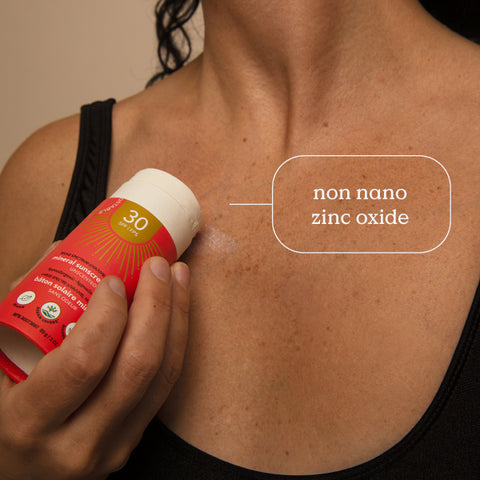#PlasticFreeJuly: 10 tips for a zero waste ritual
By 2050, plastic could outweigh the fish in the oceans.1 Unfortunately, this statistically backed prediction is not a myth. We know it can be a difficult transition to a plastic-free lifestyle, so this #PlasticFreeJuly, we reveal our best tips to help advance your progress.
What is #PlasticFreeJuly?
The #PlasticFreeJuly challenge was launched to inspire people to reduce their daily consumption of single-use plastic. Search the hashtag on social media to discover thousands of tips, from the easiest to the most advanced! To get you started, we’ve listed our ten favourite tips that can help you achieve a zero-waste daily ritual. It doesn’t matter if you adopt your new habits in July or some other time of the year, come and join the millions of people who aspire to live a plastic-free lifestyle to protect our planet.
10 Tips to Reduce your Consumption of Single-Use Plastic
-
Refuse straws and plastic utensils.
If possible, travel with reusable versions of both.
-
Stop buying bottled water.
This includes disposable coffee cups! Do the planet a favour and get yourself a reusable mug or bottle. Carry it around proudly and show the world how much you love your planet. -
Bring containers to the restaurant.
Plan on going out for a meal? Bring your own containers for the leftovers. If you’re planning on ordering take out, ask them to place the meal in your container. There’s just something about zero waste that tastes better. -
Eliminate sandwich bags.
When preparing the kids’ snacks or for those long on-the-go days, use reusable containers instead of plastic wrap or sandwich bags. No one likes soggy sandwiches or crushed goldfish crackers anyways. -
Keep a reusable bag handy.
Remember to keep a reusable bag in your car or travel bag to avoid plastic bags altogether. -
Shop greener.
At the grocery store, bring cloth bags for your fruits and veggies, buy more foods that are in bulk format, and avoid prepared or frozen meals as much as possible.
-
Turn your skin green.
Not like the Incredible Hulk! Go green for your skincare products. Make the transition to reusable, washable or plastic-free skincare products. Discover washable or biodegradable diapers, reusable razors, period panties, and plastic-free shampoos, soaps, and deodorants. -
Reuse your plastic bottles.
Assuming you haven’t become the plastic-free aficionado just yet, you must have bottles of household or body care products, still? Perfect, don’t buy any more! Instead, replenish them with eco-friendly refills like these, which contain up to 81% less plastic than bottles. -
Choose natural fibres.
Select accessories with natural and biodegradable fibres such as a natural loofah instead of a plastic shower sponge or dish soaps and toothbrushes made from bamboo. -
Use biodegradable bandages.
The Avengers aren’t the only superheroes trying to save you and the planet! Biodegradable bandages are, sort of, like the Avengers – they protect you and protect the planet at the same time!
Why Switch to a Plastic-Free Lifestyle?
Still not convinced? Maybe these statistics will help you change your mind:

- On average, a person ingests approximately 70,000 microplastic particles per year
- One million marine animals die each year from plastic pollution
- Plastic takes up to 500-1,000 YEARS to decompose
- Only 9% of plastic is recycled; the rest ends up in landfills, or worse, our oceans
- About 73% of the litter found on beaches around the world is plastic
- Humans produce nearly 300 million tons of plastic each year – which is increasing by 9% annually
- About 500 million plastic bags are produced each year
- In the same span, 40 billion disposable utensils are used and thrown away
- 50% of the plastic produced each year is only used for a few minutes before being thrown away
- There is approximately 200 million tons of plastic waste in the Atlantic Ocean
Our Commitment to You: Offer Sustainable and Plastic-Free Options
Tips and statistics are good eye candy but, concretely, what is ATTITUDE doing to promote the plastic-free lifestyle? We offer vegan products made from healthy ingredients, according to the EWG, that are offered in sustainable and fully recyclable or biodegradable packaging.
Our eco-refills for household and care products contain up to four times more product and 81% less plastic than their bottled counterparts. It’s a great trick to reduce your plastic consumption and your trips to the pharmacy. Even more revolutionary is our new collection of leaves bar™ Beauty Bars and Mineral Sun Sticks – all completely plastic free!
Our Beauty Bars include a variety of hair and body care products formulated with powerful and naturally sourced ingredients. With their solid and creamy textures, these easy-to-use bars emit delicate aromas that are simply irresistible. Zero plastic waste, and above all, zero compromise on efficiency. Our mineral sun sticks, on the other hand, are made with non-nano zinc oxide, the safest and most effective sun filter according to the EWG. And since they are packaged in FSC-certified cardboard tubes, there’s no trace left behind on you or the planet!
Plastic Pollution: A Social and Environmental Crisis
Did we catch your attention? You can learn more about the devastation caused by our excessive consumption of single-use plastic by reading our series of articles on the subject. These articles will allow you to gain a deeper understanding of the origins, the effects and the solutions needed for a profound and essential transformation.
Sources
- https://www.futureagenda.org/foresights/plastic-oceans/
- https://seedscientific.com/plastic-waste-statistics/
- Statistics Source : Seed Scientific, 51+ Disturbing Plastic Waste Statistics, https://seedscientific.com/plastic-waste-statistics/



